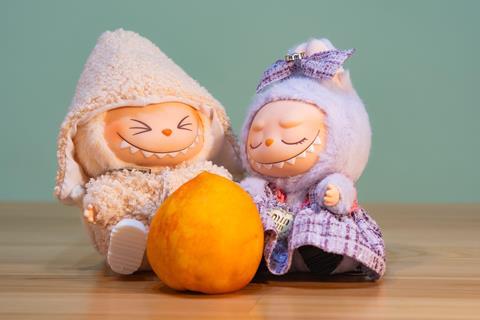Woman Alive deputy editor, Jemimah Wright explores the widespread fascination with Labubu dolls - from their position as Kim Kardashian’s latest accessory to the sky-high auction prices. Should Christians ignore such trends, or is the chasing of comfort through material things an example of the search for deeper hope?

My niece, Honor, has just had her sixth birthday, and for it, along with her uncle’s, I got her a Maileg Matchbox Mouse – a sweet little material mouse in a matchbox…apparently all the range amongst her age group. In my day it was Cabbage Patch Dolls. There is usually something, with the help of strong marketing, little girls are craving after, but they grow out of sweet little toys….or perhaps turn the desire to bigger items, like handbags and shoes?
Kim Kardashian has seemingly regressed to childhood, along with a swathe of other celebrities. She was recently photographed stepping out of her car clutching not a designer handbag, but a small, wide-grinned toy with pointy ears and nine sharp teeth: a Labubu doll.
READ MORE: Meeting The Teddy Bear Ladies
What began in 2015 as a quirky character sketched by Hong Kong–born illustrator Kasing Lung has grown into one of the biggest collectible crazes of the decade
What began in 2015 as a quirky character sketched by Hong Kong–born illustrator Kasing Lung has grown into one of the biggest collectible crazes of the decade, a trend fuelled by celebrity endorsements, social-media hype and an insatiable appetite for all things rare and whimsical. Produced by the Chinese company Pop Mart, Labubu dolls are sold mainly through blind-box packaging, meaning buyers never know which version they’ll get. The surprise factor, combined with limited editions and themed collaborations, has driven collectors to spend hundreds—or even thousands—of pounds to secure a coveted figure. One giant Labubu recently sold for well over six figures at auction, proving that this odd little creature has graduated from novelty to serious status symbol.
READ MORE: Blankets to comfort
Celebrities have taken the lead. After BLACKPINK’s Lisa used a Labubu as a bag charm, others followed: Rihanna, Dua Lipa, David Beckham and, of course, Kardashian herself. Their posts turned a niche vinyl toy into an “it-accessory,” and TikTok videos of unboxing sessions have turned casual interest into a full-blown cultural wave. Psychologists suggest part of the allure lies in the dopamine rush of surprise, the thrill of scarcity, and the sense of belonging that comes from joining a global community of fans who trade photos, tips and toys. Labubu offers both nostalgia and novelty: its mischievous grin recalls childhood play, while its limited-edition drops feel more like luxury fashion than Saturday-morning cartoons.
But what does this craze really say about us?
But what does this craze really say about us? Beneath the playful exterior lies a deeper truth about modern culture: we are searching for joy, meaning and identity in things we can hold in our hands, however briefly. The Labubu phenomenon is harmless fun for many, an artistic hobby, a way to connect with friends, a creative outlet for photography or display. Yet for others, it becomes another form of material chase, where personal worth feels tied to whether you scored the ultra-rare version before it sold out. Like any collectible trend, it offers comfort and status, but only temporarily. The moment the next series launches, the thrill resets.
READ MORE: GREAT SEXPECTATIONS: Why is my boyfriend always playing video games?
As Christians, we might smile at the sight of grown adults frantically hunting for cartoonish creatures, but the right response isn’t scorn. This longing for beauty, belonging and delight is profoundly human. Labubu dolls may be vinyl and paint, but the desire behind them, the yearning to be part of something special, is real. Instead of mocking such trends, we can see them as cultural signposts, pointing to a deeper hunger. When people chase the next collectible, what they often crave is not the toy itself, but the feeling it brings: excitement, recognition, maybe even comfort in a world that often feels chaotic.
The gospel offers a different kind of treasure. Where Labubu’s charm fades, Christ’s love endures. Where limited editions create anxiety, God’s grace is never in short supply. While these dolls provide a fleeting spark of joy, they cannot satisfy the deeper longing to be fully known, fully loved and eternally secure. In a society that constantly urges us to keep buying and upgrading, Christians can live as people who have already found the ultimate gift. That doesn’t mean we can’t appreciate playful design or creative artistry—but it does mean we hold such things loosely, refusing to let them define us.
Perhaps, rather than laughing at the craze, we can use it as a conversation starter: What do these little creatures mean to you? Why do you think we love collecting things so much? And what if there’s a kind of joy you don’t have to chase or pay for, a joy not boxed in plastic, but anchored in a Person who never goes out of style? Labubu dolls will come and go, but the hope offered in Christ is neither rare nor fragile. It’s freely given, abundant, and far more precious than any limited-edition figure, even the one in Kim Kardashian’s hand.




































No comments yet